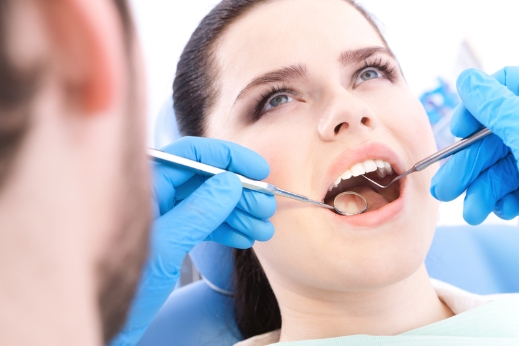PROTECT YOURSELF FROM GUM DISEASE
THERAPY
Periodontal disease is the technical term for gum disease, and an infection that progressively affects the tissues and bones surrounding your teeth. It ultimately causes the gums to pull away from the teeth and leave gaps that can become infected. As bacterial toxins are released from the infection, the body responds to the infection by breaking down the bone structure and connective tissue that keep our teeth in their proper place. Eventually the affected teeth will become loose. They will either fall out or have to be removed. Periodontal disease has also been linked to diabetes, cardiovascular disease, stroke, bacterial pneumonia, and pregnancy complications.

All about
periodontal therapy
How do you know if you have gum disease?
This can be challenging to discern without a trip to the dental office. Periodontal disease does not always display clear symptoms. This is part of what makes regular checkups, cleanings, and x-rays so important.
What are the warning signs of periodontal disease?
- Bleeding gums after regular brushing and flossing
- Gums that are red, swollen, or tender
- Gums that have receded (pulled away from your teeth)
- Persistent bad breath
- Pus exuding between the teeth and gums
- Teeth that have become loose
- A change in your bite or denture fit
How can you prevent periodontal disease?
1Consistent, daily oral hygiene will greatly reduce your risk
2Brush and floss at least twice each day
3Good nutrition will help your teeth and gums
4Consistent, regular dental check-ups
"I'm not sure when dentistry began hybridization with a salesman, but I've never felt pressured to make any financial decisions or felt like I was being sold on an idea like I have at other dentists. I've had dentists that rush through appointments, have way too many patients to take care of at once and are too busy to answer my questions. Dr. Paul is the complete opposite. He's always willing to talk with me about any questions or concerns I have concerning my dental health."
-Braden (Yelp)
“I’ve been to quite a few dentists throughout my adulthood, some of which I went to because they were highly recommended and others due to their exemplary reviews on Yelp. After my last dental experience with one of the “5 star” dentists, I was hopeful that everything patients said about Dr. Paul was true. A dental cleaning (didn’t try to upsell me with some “deep cleaning” nonsense), crown and a few fillings later, I can with 100% assuredness say that I made the right choice coming to Genuine Family Dentistry. The staff is friendly, the prices are fair as can be, their system for appointment reminders is helpful and Dr. Paul’s chair-side manner and calm demeanor always kept me at ease.”
Braden (Yelp)
"I did not feel any pain whatsoever. Felicia was caring, yet focused on my well being & accomplished her task of cleaning below my gum lines w/ no issues or any pain. It's been 5 yrs since I had this procedure performed on me, yet it was such a pleasant experience."
-Mas (Yelp)
Proudly, and with excellence,
offering various treatments
Different options are available and will be chosen based upon the severity of your condition.
SRP is also known as Deep Cleaning or Periodontal Cleaning. Our professionally-trained hygienists at Genuine Family Dentistry will perform a deep cleaning treatment that removes plaque and tartar that is hiding in each periodontal pocket. This procedure will include planing, or smoothing, the surface of the tooth’s root and removing any calcified bacteria. This will allow the gum tissue to heal and become healthy again. The gum will reattach itself to the tooth. While the planing procedure may take more than one visit, eventually you will be able to maintain your healthy gums at home.
In some cases, Dr. Paul Athanasius may prescribe certain medications to be used in non-surgical periodontal treatment. This medication would help control the bacterial infection and allow the gum tissue to heal. The medications can include antibiotics, a mouth rinse, or a substance that is placed into any periodontal pockets after a scaling and root planing treatment.
This treatment allows your dentist to deal with hard-to-reach areas. Sometimes periodontal disease will not respond satisfactorily to non-surgical treatment. In these cases, Dr. Paul Athanasius may suggest removing the built up plaque and tartar through periodontal surgery. After this treatment, the affected gums will be stitched into place to provide a snug fit around the tooth. A bone graft may be necessary if excessive bone structure has been destroyed by the periodontal disease.
Dr. Paul Athanasius offers transparency and is a leader in providing honest and genuine care. There is big-chain dentistry with multiple offices and doctors, and there is Genuine Family Dentistry, which is a boutique cutting-edge dental practice run by one doctor. Dr. Paul Athanasius treats each patient with care and individualized attention, helping them make educated choices in the treatments options. Make time now to request appointment in the form below and see how Genuine Family Dentistry can meet all your dental needs!

